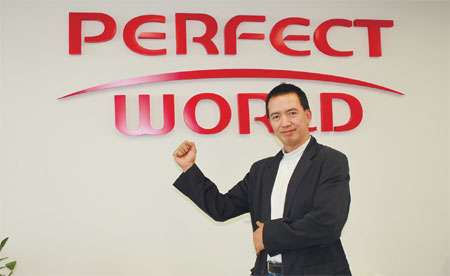A 'Perfect World' to game to the top
Updated: 2013-08-30 11:22
By Zhang Qidong in San Francisco (China Daily)
|
||||||||
|
Alan Chen, CEO of Perfect World Entertainment Inc, hopes his business can become a top online game company in North America in a few years. Zhang Qidong / China Daily |

Alan Chen started the US operation of Perfect World Entertainment from scratch in 2008. His first company meeting was in a hotel lobby in Redwood City, California, with his first three employees.
The company started generating profit soon after launching its first online game, PWI, in September 2008, and has continued to grow the business at a double digit percentage each year since then.
Perfect World Entertainment now has 30 million players of its games in the US, and Chen, in his fifth year as CEO, told China Daily USA that Perfect World Entertainment's 2012 revenue was over $70 million.
"In a way, I am glad I started our US operations from scratch, since I had a perfect opportunity to select talent, build the team and mingle professional management with creativity," said Chen, "I like to do things differently in strategy, and make the ordinary extraordinary in execution."
Perfect World Entertainment - the US subsidiary of the Chinese company Perfect World Co Ltd - has been primarily offering free-to-play Massive Multiplayer Online Role-Play Games (MMORPG) over Microsoft Windows and Mac platforms to players in North America. It has published dozens of popular titles, including Dungeons & Dragons, Neverwinter, Star Trek Online, Blacklight Retribution, PWI, Forsaken World, Battle of Immortals, Fortuna and Frosaken World.
While succeeding in the PC online-game market, the company has also moved into the fast growing mobile-game market.
"We are actively looking for investment opportunities in the mobile games market, and we plan to build a balanced business portfolio between PC and mobile games in the next 15 months," Chen said. "We will publish our first mobile game called Elemental Kingdom in October this year and a dozen additional mobile games throughout next year."
According to Business Insights, the world video-gaming industry is predicted to have an annual growth rate of 9 percent through 2013 and to exceed $76 billion. Mobile and online gaming formats will fuel the market, with customers taking advantage of wider, faster and more mobile Internet access, which is estimated to generate $20 billion by 2015.
MMORPG is regarded as the most popular online-game genre supported by the sophisticated 3D rendering technologies. It provides players an immersive virtual world, where they can create their characters, adventure in quests, collecting/crafting materials and treasures, combating with monsters, explore dungeons, PK with other players and progress in the fantasy world.
An industry leader in deploying the free-to-play or micro transaction business model in MMORPG, Perfect World differentiates dramatically from traditional MMORPG. With this business model, players can download and play the games for free. Players also can choose to purchase in-game virtual items if they like the game and want to invest in the game to gain more experience.
Chen attributes his success to combing vision, innovation and business execution into one.
An executive with 20 years' high-tech experience in multinational companies, including Nortel Networks, Lucent Technologies Inc, and Hewlett-Packard Co, his corporate-management expertise provides enormous value to the online-game company as it moves forward in North America.
Chen, from Chengdu, Sichuan province in China and a graduate of Beijing University of Posts and Telecommunications, obtained his doctorate from Ottawa University in electrical engineering in less than two years.
"I didn't spend much time to prepare my PhD thesis. Instead, my strategy was to focus on getting individual papers published, which naturally became the chapters of my thesis," he said.
According to Chen, an executable business plan together with a commitment to deliverables is a key to success in expanding business from China to the US and any shortcut may not work.
Chen planned the operation in three phases. Phase one was to localize and publish existing Chinese games; the second was to license third-party games in the flavor of Western players; and the third was to invest in US game developers to provide tailor-made games to Western players. In 2011, Chen led the acquisition of Cryptic Studios from Atari.
"The reason is simple: We aim to play in the mainstream and have a leadership role in the US market," he said.
"It's been great working with Perfect World," said Jack Emmert, CEO of Cryptic Studio. "With Perfect World's expertise and support in micro transaction and our strengths in Western game play, we delivered a wonderful game Neverwinter."
"Can't wait ... though I still need to dig down and level my wizard and rogue. Neverwinter Online is awesome!" said a gamer on the Neverwinter Forum page.
Many Chinese companies want to expand into Western markets and find it's challenging because they lack knowledge about the market. Bringing video games to the US from China has proven to be even more challenging as it deals with product requirements and cultural barriers.
"For example, Wu Lin Wai Zhuan, or Legend of Martial Arts, is a very popular TV comedy show in China and the online game based on the show has been very successful. However, Western players found it no fun at all, and so they didn't like to play the game," said Chen.
"Westerners are more motivated by enjoying the experience of playing the game. In China, it's more of a social matter of showing off - like how to get to the maximum level as fast as possible and beat everyone else in one shot. So it could be very challenging to make one game that's universally popular, especially if it's an MMO," said Chen.
According to Chen, the company put a lot effort into localizing games in both languages and game content to satisfy American players' needs. The company established a dedicated product-management team in China that directly communicates with Chinese developers to ensure the needs from the US are met. "American players are pretty forgiving as long as the game is well localized and polished," said Chen.
Another major difference between doing business in the US and China are legal matters.
"Relationship, or guan-xi, hardly solves business disputes in the United States," said Chen. "We need to be very careful in constructing deals and communicating with third-parties following the business law to prevent problems from happening. Things like copyrights, intellectual properties, and indemnification are very sensitive clauses in contracts. Companies would easily get sued and penalized otherwise in the United States."
With more than 300 employees at the US subsidiary and about 5,000 worldwide for the Perfect World company, Chen said it is well positioned to capturing new business opportunities in the mobile-game market and build a massive and service-oriented platform for future success.
Chen said maintaining high-speed growth in revenue and profit has been a constant challenge. That, however, does not stop him from making grand plans for the future.
"We are already number one in the free-to-play MMORPG market in the US, and I'd like to see us becoming one of the top gaming companies in North America in the next five years," he said.
Chen and his wife and two sons live in Los Altos, California.
kellyzhang@chinadailyusa.com
(China Daily USA 08/30/2013 page11)

 Chinese Films in the US: Not a full house
Chinese Films in the US: Not a full house
 Jeremy Lin's campaign of animal protection
Jeremy Lin's campaign of animal protection
 Solar panel maker hits milestone
Solar panel maker hits milestone
 Vineyards pour billions into chateaus
Vineyards pour billions into chateaus
 Fair brings Hami melons to Beijing
Fair brings Hami melons to Beijing
 Court sentences 56 for telecom scam
Court sentences 56 for telecom scam
 Foreigners given opportunities to shine
Foreigners given opportunities to shine
 US vows action in Syria even without UN backing
US vows action in Syria even without UN backing
Most Viewed
Editor's Picks

|

|

|

|

|

|
Today's Top News
Experts: Fed's taper is a key issue for G20
Chinese shifting attention to US stock markets
Washington State governor plans Chinese mission
US readies possible solo action against Syria
Visa issues resolved in new policy
Xiaomi hires Google exec
Solar panel maker hits milestone
Report spotlights China's global role
US Weekly

|

|







